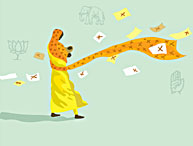Off campus
Cruising

Summer road trips are the best. Wind in your hair, the smell of sun on skin, favourite tunes on sound system, kids in the back screaming at each other (well, maybe you can leave them at home). Stan Posner and Sandra Phillips-Posner (of Smart Shopping fame) have provided road gypsies with a book on the Interstate-95 and all of the fun that awaits at each exit. So on your next drive down the American East Coast all the way to Florida's tip, you'll know which exits to veer off of if you're looking for a Gourmet Magazine ranked hot dog joint, a nearly 300-year old fort, or to visit Mystic Pizza, the parlor that inspired a movie staring Julia Roberts. They also include each exit's amenities, maps, and what radio stations you can tune into on the road.
Drive I-95: Exit by Exit Info, Maps History and Trivia, $29.95 in Canada, published by Travelsmart. For more info see www.drivei95.com.
Dropping in
Project 10 has opened a new drop-in group in the West Island for gay, lesbian, bisexual, transgender and transsexual or questioning youth ages 14-25. June 8, 6 pm to 8 pm at De-zone, 99 Place Frontenac, Pointe-Claire. Gatherings happen every two weeks. Other services are available in greater Montreal (ongoing drop-in every Weds. night 7 pm to 9 pm at 6 Weredale Park). For more info, call (514) 989-4585 or go to www.p10.qc.ca.
Picnicking

Looking for the perfect food to eat while sitting on the grassy knolls of McGill's campus? Think like a fish out of water and go to Sushi Shop on 915 Maisonneuve W, just west of McGill College. From salad with strips of just-grilled tuna to rows of elegant maki rolls, there's some delectable for everyone. Raw fish make you nervous? Try their smoked salmon or grilled eel sushi, or any of their half-dozen with cooked fish. Just don't leave it sitting in the sun...
Indian people opt for secular democracy
A founding member of the Centre d'étude et ressources d'Asie Sud, pharmacology professor Daya Varma reflects on the meaning of the recent Indian elections.

The results of India's 14th parliamentary elections surprised everyone -- the winner, the loser, the pollsters, the news media and the political analysts. Indian National Congress (Congress) led by Sonia Gandhi secured 145 seats and together with its allies control 217 seats in the 543-member Parliament. The ruling National Democratic Alliance (NDA) led by the Bharatiya Janata Party (BJP) of Atal Bihari Vajpayee bagged 185 seats; BJP's share was 138. Communist parties and their allies were third, with 62 seats.
Indian elections are festive. Every building, wall, tree and lamppost is plastered with posters and graffiti. On the sidewalks, buses and trains, people are engaged in animated arguments about the election and everyone is predicting the outcome. This lively interest imbues the social fabric of India.
The recent elections were held in four phases between April 20 and May 10, and results were announced on May 13. There were a total of 5,398 candidates, 675 million registered voters and 200 political parties. A total of 387,453,223 citizens (nearly 56 percent) voted at one of the 700,000 electoral booths (one in Ladakh at a height of 5,180 meters!), and one million electronic voting machines tabulated the results using 8,000 metric tons of paper. There was no Florida-like bungling. The winner usually polls over 300,000 votes; the highest by a candidate in this election was 855,543. The elections went rather smoothly to the credit of the Election Commission and the maturity of the Indian civil society. Indian elections prove that it is not the formal education that ensures democracy -- it is the political maturity of the people, rooted in their lived experiences.
The ruling NDA government had called the elections six months before they were due and confidently entered the fray with the slogans "India Shining" and "Feel Good," in obvious reference to what many perceived as a booming economy, over 8 percent projected growth and the warming of relations between India and Pakistan.
The reasons for the electoral outcome of any election are a matter of speculation and debate. Most analysts agree that the Indian electorate repudiated the Vajpayee government's economic policy, which led to the impoverishment of farmers and regionalization of poverty in India's most populous states, Uttar Pradesh and Bihar. For the vast masses, India was not shining. Rashtriya Swayamsewak Sangh (RSS), the ideological wing of BJP, contends that the main cause of their defeat was their failure to highlight "the emotive chord of Hindu nationalism, the bedrock of our nationhood." In my opinion, the defeat of Vajpayee's party was a repudiation of its economic policy of reckless privatization, its aggressive Hinduism and its pro-U.S. foreign policy. India is the home of nearly 150 million Muslims and 30 million Christians; they felt insecure in Vajpayee's India. The majority of Hindus have a different vision of what Hinduism is than does RSS. Furthermore, NDA's main support base was the affluent middle class; with time, their influence was waning and that of the working masses rising.
Sonia Gandhi led her party on a simple platform of defending the secular foundation of India and addressing the need of the poor and rural India, home of 70 percent of Indians. She also had the benefit of history. Her Congress Party led India to independence in 1947 and is perceived as the architect of a secular independent India.
What effect will the change of government have on the internal and foreign policies of India? First of all, it confers relief to the minority community of India, which felt terrorized during the six years of Vajpayee government. This in itself is a big thing. The new government is unlikely to dismantle the policy of economic liberalization of which the new prime minister, Manmohan Singh, was the architect. However, it will be obliged to readjust these policies and bring the marginalized section in its fold.
India—Pakistan relations are unlikely to change. Bigger and better initiatives in improving India—Pakistan relations were taken by the Congress Party in the past than were taken by Vajpayee in the last few months: the Tashkent (then part of the Soviet Union) Accord by the late prime minister Lal Bahadur Shashtri (in whose honour the Shashtri Indo-Canadian Institute was instituted) and Simla Accord between Indira Gandhi and Pakistan's Bhutto (both were later killed) are two examples. Moreover, Indo—Pakistani accords by the Congress Party reflected independent initiatives taken by the two governments. Improvements in Indo-Pakistani relations during the Vajpayee regime were initiated by the U.S., which needs both countries to materialize its Central Asia and Middle-East objectives.
Why did Sonia Gandhi decline the high position of prime minister of the world's largest democracy? This is unprecedented in history. In my opinion, she did it in the larger interest of India. Hindu fundamentalists have been using her Italian birth to arouse mass hysteria against her, though she was quite acceptable to the Indian people, just as the election of an Indian-born NDP leader to the premiership of BC was acceptable to the Canadian people.
Hindu fundamentalists will go to any extreme to undermine the pluralist and secular fabric of India. As soon as the election results were out and Sonia Gandhi was unanimously elected as the parliamentary leader, BJP leaders initiated protests and even threatened her with her life. While refusing the high office of prime minister of India, she said, "Power in itself has never attracted me, nor has position been my goal. My aim has always been to defend the secular foundation of our nation and the poor of our country... That is a long and arduous struggle, and I will continue it with full determination." In my opinion, she declined the high office to save India from uncalled-for turmoil. This may embolden fundamentalists, but will certainly win the hearts and souls of the Indian masses and respect of the international community.
Does the defeat of the Vajpayee government have any repercussion in Canada? I think it does. There are nearly one million Canadians of South Asian origin. Since BJP came to power, the Indian community has been polarized -- secular versus non-secular. The massacre of innocent Muslims in February and March of 2002 in the BJP-ruled state of Gujarat under the government's indifference, if not complicity, caused further division. It is an interesting paradox that Canadians of Indian origin do not want to be discriminated against here, and yet many can find justification for discrimination or even brutalization of minority communities in India. A secular, democratic India providing equal opportunity to all its citizen will undoubtedly generate a healthy atmosphere within the South Asian community in Canada.
